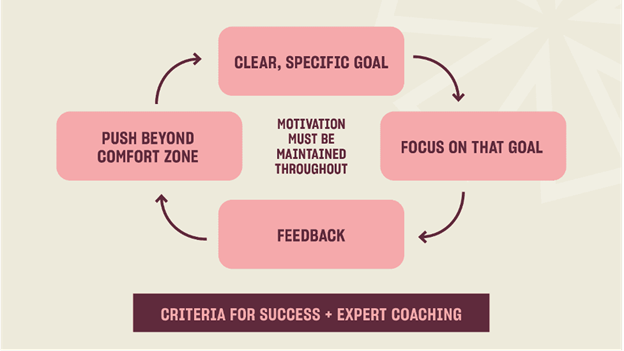What Can Salespeople Learn from the Expertise of Olympians?

Why do some people get really good at something while others become (or stay) stagnant? Is it natural athleticism or some inherent trait that makes them better? It is common to find recreational golfers and skiers who have not improved their performance after years of experience. Similarly, there is a weak correlation between performance and length of experience after individuals have gained their first year of experience.
What do Olympians do differently? With the Winter Olympics on our doorstep, it is a good time to explore the topic of expertise and how to best attain it.
Inherent Abilities Do Not Lead to Expertise
Renowned expertise researcher, Dr. Anders Eriksson, professor of psychology at Florida State University, has dispelled the notion that natural athleticism or superior intelligence are required for expert performance. This position is in direct contrast with common sense. Most of us believe the best athletes are simply more athletic; however, while being gifted may be helpful, it is not the secret sauce of expertise.
Why Amateurs Remain Amateurs
When learning a new skill or sport, the early stages consist of avoiding mistakes. The more experience, the fewer mistakes. This makes sense. Learning no longer focuses on achieving an “acceptable level” of performance. What happens is that we stop thinking so much about tasks such as skiing – and even selling – that they become automated.
Once a task has become automated, more experience does not typically lead to better performance. This is why there is a very low correlation between experience and expertise. Getting better at a task requires deliberate training activity that takes individuals beyond their current comfort zone and challenges them to improve performance.
Deliberate Practice Makes the Difference
How do Olympians practice their sport in a way that allows them to move past novice to expert? According to Eriksson, experts engage in deliberate practice. They practice highly specific tasks related to their domain in a very deliberate way.
In addition, no individual reaches elite status without the help of coaches and teachers. Those coaches and teachers help structure practice to ensure consistent improvement. Coaches and teachers structure practice through continuously increased challenges – raising the performance beyond its current level.
Deliberate practice incorporates the following four elements:

Experts Are Better Decision Makers
According to Eriksson, expert performers have acquired mental models that allow them to access relevant information that supports flexible reasoning about a task or situation. This advantage is about anticipatory skills rather than innate abilities. They know what to look for – and what to do when they find it.
It is about equipping oneself with a decision-making model to internally monitor what is happening and compare it with the goal. This internal monitoring is highly task specific. These decision-making mechanisms displayed by experts allow them to transcend the limiting factors present in an amateur’s performance and avoid the arrested development associated with automated tasks.
Expert Sales Managers and Salespeople Are Better Decision Makers
Recent research indicates that high-performing sales managers and salespeople are better decision makers – and that the quality of their decisions leads to better performance. How does this work? Well, let’s start with sales managers.
Our management practices research, published in our book Crushing Quota, indicates that high-performing managers do not do “more” than their lower-performing peers – they do things differently.
They coach fewer hours, for longer durations, and discuss fewer topics. What do they coach? The activities that are most critical for the achievement of their KPIs and associated quotas. They prioritize what matters most and attend to those priorities in very structured, effective ways. These managers make better decisions about “what” to coach and “how” to coach. Better decision making ultimately leads to better coaching and better coaching outcomes. But what about salespeople?
Research into high-performing sellers (originally conducted by Florida State University’s Sales Institute and expanded by VantagePoint) found that high-performing sellers are agile. They adjust their sales approach based on the buying situation they face. In other words, they evaluate the situation they are facing and choose the optimal path forward. They don’t use a one-size-fits-all approach. High-performing sellers spend more time than average sellers assessing their buying situations before selecting and executing an appropriate sales strategy. It is the quality of these decisions that leads to better execution and better outcomes.
Implications for Sales Enablement
If we take into account the research findings for high-performing sales managers and salespeople, we can tie their behavior to deliberate practice that can be implemented within the sales enablement function. Sales managers can be trained in ways that educate them on better decision making that replicates high performer behavior to assess the situation they are facing (which seller, in which situation), select the best type of coaching (which high-impact activity to coach, within which frequency, duration, and topics), and then apply that rhythm over time.
Salespeople can be trained to identify the buying factors that most significantly impact their buyers, determine how those factors align with unique buying situations, and then choose to execute the best sales strategy to lead to a win. This is in sharp contrast to the way most salespeople are trained. Most sellers are trained in an individual methodology and instructed to use that approach in every buying situation. This takes the decision making (and overall effectiveness) out of the enablement effort.
Effective sales enablement involves:
- Identifying which behaviors lead to the highest performance
- Structuring training activities around those behaviors
- Monitoring trainee performance against standards
- Providing increasingly challenging practice and feedback over time as performance improves.
This implies a long-term approach to sales enablement rather than the more traditional episodic approach to training. For this reason, most of our clients realize the need for more robust enablement over time and are choosing to engage with us for multiple years.
Expertise in sports and selling is an ongoing endeavor. Maintaining expertise requires ongoing practice, feedback, and coaching.
Michelle Vazzana is the chief strategy officer and co-founder of VantagePoint Performance, the leading global sales effectiveness firm. She is the author of Crushing Quota: Proven Sales Coaching Tactics for Breakthrough Performance, and co-author of Cracking the Sales Management Code: The Secrets to Measuring and Managing Sales Performance.
Get our Enewsletter
Get the latest sales leadership insight, strategies, and best practices delivered weekly to your inbox.
Sign up NOW →